While we can all recognize a duck vs goose, there are many differences between these two birds that you may not have thought about. While both belong to the same family of waterfowl known as Anatidae, these two types of birds live very different lives, especially depending on their individual breeds and ages.
In this article, we will address some of the primary differences between ducks and geese, as well as some tips to help you tell them apart if you are unsure. We will also dive into detail regarding these birds and their diets and mating habits. Let’s get started now!
Comparing Duck vs Goose
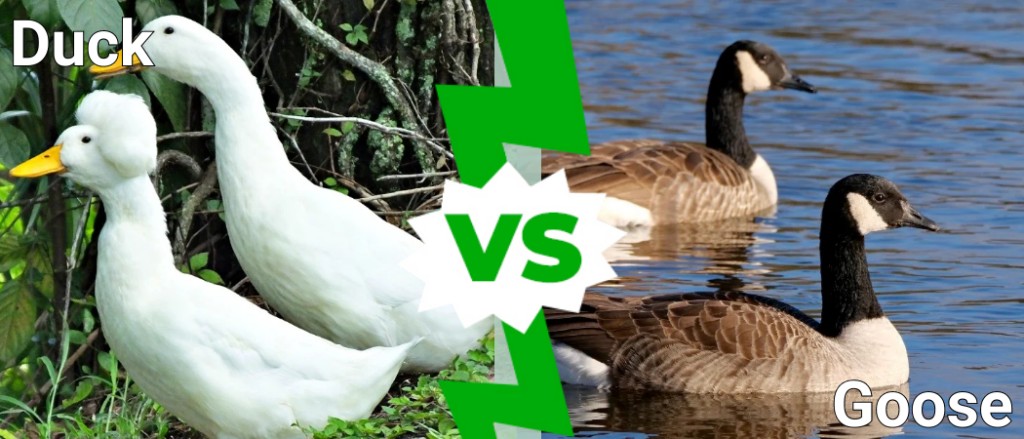
| Duck | Goose | |
|---|---|---|
| Family | Anatidae | Anatidae |
| Size | 15-25 inches; 2-5 pounds | 30-50 inches; 15-20 pounds |
| Appearance | Compact body and neck; feathers are usually much more colorful; bill is wider and longer than goose | Large body and very long neck; feathers found in plain colors and patterns; bill is shorter and more pointed than duck |
| Diet | Omnivorous, including grass and small fish | Herbivorous, including algae and plant matter found on land |
| Lifespan | 3-8 years | 8-12 years |
The Main Differences Between Duck and Goose
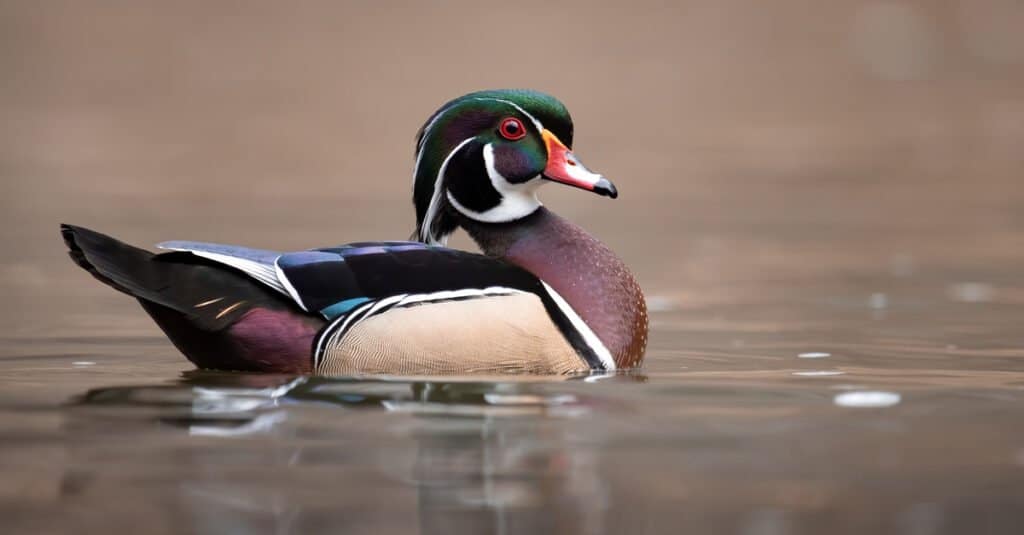
Ducks have more colorful feathers when compared to geese, especially male ducks.
©Harry Collins Photography/Shutterstock.com
There are many key differences between ducks vs geese to help you tell them apart. Geese are much larger in both length and weight when compared to ducks, and their necks are longer as well. Ducks have more colorful feathers when compared to geese, especially male ducks. Finally, a duck vs goose differ in their diet and lifespans, as geese live longer and are herbivores, while ducks live shorter lives overall and eat an omnivorous diet.
Let’s discuss all of these details in more detail now.
Duck vs Goose: Size and Weight
The main difference between ducks vs geese lies in their difference in size and weight. Geese are much larger than ducks, and they have elegant long necks compared to the average length of a duck’s neck.
The average duck, depending on species, weighs anywhere from 2-5 pounds, while geese weigh double that. Ducks often grow anywhere from 15 to 20 inches in length, while geese reach 30 to 50 inches, depending on the specific breed. This is a huge difference in size, and you can easily tell this when looking at a duck and goose side-by-side.
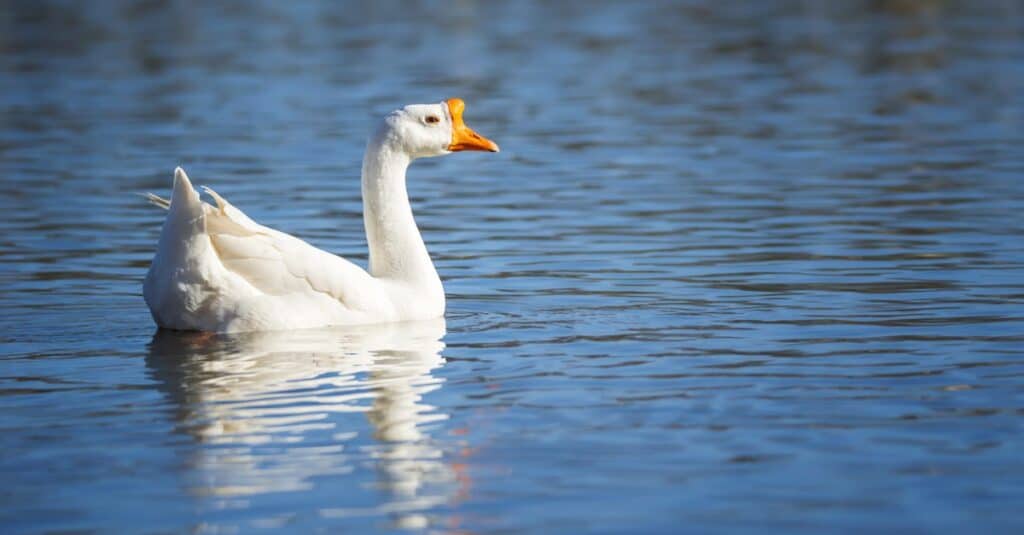
The average duck, depending on species, weighs anywhere from 2-5 pounds, while geese weigh double that.
©iStock.com/leekris
Duck vs Goose: Appearance
Another difference between ducks and geese can be found in their appearances. Besides their overall size differences, ducks tend to have much more colorful feathers when compared to geese. While it will always depend on the specific breed, the majority of ducks, especially male ducks, have brightly colored feathers and intricate patterns. Geese tend to be more muted in color as well as pattern.
Ducks also have wider and longer bills when compared to geese, and this is likely due to their dietary differences. Geese have bills that are equally strong, but they are usually significantly shorter in length when compared to duck bills.
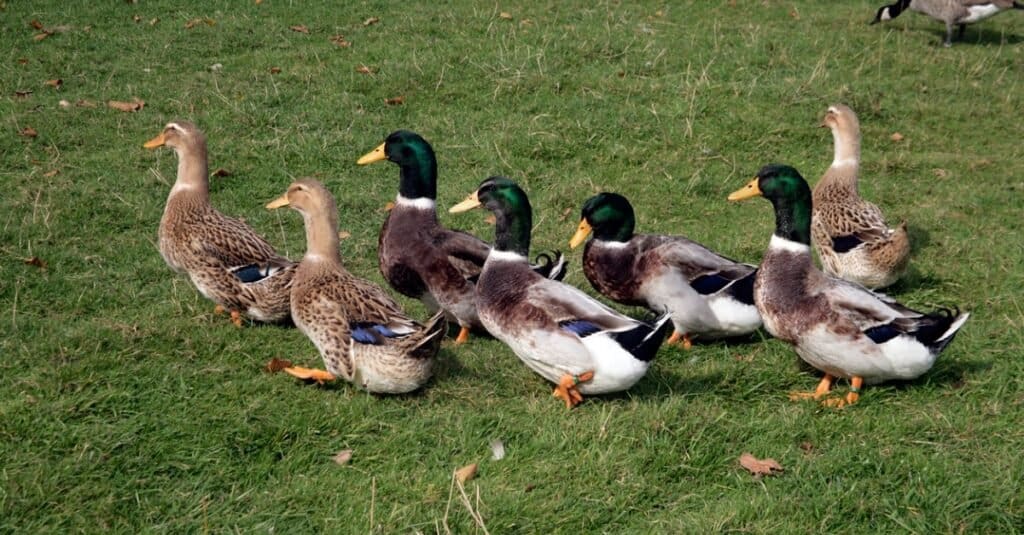
Ducks have wider and longer bills compared to geese, and this is likely due to their dietary differences.
©iStock.com/MikeLane45
Duck vs Goose: Diet
While it depends on the specific breed of duck or goose, these birds tend to have different diets. While ducks are known for their omnivorous diets, geese are primarily herbivores. Geese tend to eat plant matter, both in and out of the water, while ducks eat a wide variety of fish and crustaceans, depending on their breed and local environment.
Duck vs Goose: Lifespan
Another key difference when it comes to duck vs goose lies in their lifespan. Geese have longer life spans than ducks overall, living an average of 8 to 12 years, while ducks live an average of 3 to 8 years total. This is a statistic based on wild ducks and geese, as captive waterfowl tend to live longer lives.
The reason that ducks likely have a much shorter life span than geese is due to their smaller size and less aggressive behavior. Many ducklings don’t reach a full year of living due to predation and inability to protect themselves. Geese tend to be more aggressive than ducks overall and are fierce protectors of their babies.
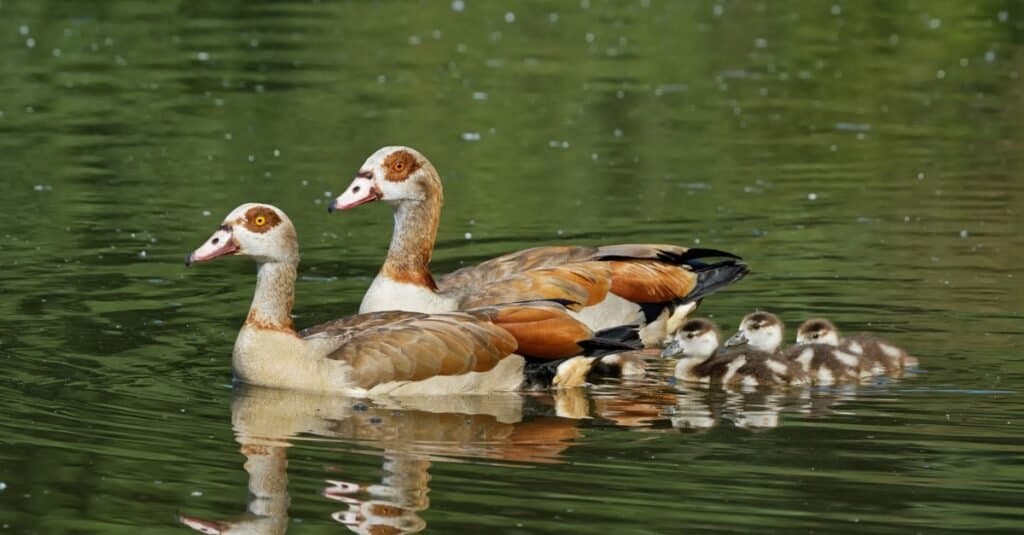
Geese have longer life spans than ducks overall, 8 to 12 years, while ducks live 3 to 8 years total.
©Bildagentur Zoonar GmbH/Shutterstock.com
Duck vs Goose: Mating and Breeding Habits
One more important difference between ducks vs geese is their mating and breeding habits. While both of these birds are largely considered monogamous, this definition is loosely based around their breeding times, year after year. Let’s talk about this in more detail now.
For example, geese are largely considered totally monogamous, committing to a partner for the duration of their lifespan. Ducks are different from the geese in this way in that they remain monogamous with a partner for a single breeding season, seeking out new partners the next year for breeding purposes.
Many studies suggest that this monogamy is one of the reasons why geese are more aggressive than ducks around mating season. Male geese take equal parts in taking care of their young, not leaving everything up to the female goose. This is a surprising change of pace when compared to just about any other animal in the animal kingdom, but especially birds.
What About Differences in Their Necks and Feet?
Good question! The necks and feet of ducks have differences too. Scientists differentiate ducks and geese by their neck bones: Ducks have up to 16 bones in their necks, but geese (and swans) have 17-24 neck bones.
As to the feet, they are almost exactly the same size for ducks and geese; however, geese feet have more prominent webbing. In addition, geese have large webbed toes that end in short toenails. While we are talking about lower appendages, it is worth noting that the legs of geese are slightly taller in proportion to their bodies than that of ducks.
The photo featured at the top of this post is © JonVallejoPhotography/Shutterstock.com
Thank you for reading! Have some feedback for us? Contact the AZ Animals editorial team.






